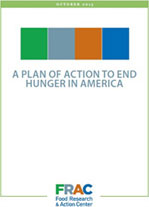Media Contact:
Emily Pickren
epickren@frac.org
202-640-1118
WASHINGTON, September 13, 2019 – The Food Research & Action Center (FRAC), the nation’s leading anti-hunger advocacy organization, today joined the National Housing Law Project and the Center for Law & Social Policy (CLASP) in filing an amicus brief in five jurisdictions to oppose the implementation of the Trump administration’s public charge rule. The groups, represented by Keker, Van Nest & Peters, LLP, note in the brief that the Trump administration’s radical expansion of the public charge rule would damage the well-being and economic stability of immigrants and communities across the country. The rule is slated to take effect on October 15 unless Congress or the courts act to stop or delay it.
“This rule would increase hunger and poverty across the nation, and force immigrant families — including those with U.S. citizen children — to make impossible choices between food and family,” said Jim Weill, president of FRAC. “The intended effect of this rule counters everything that this nation stands for by instilling fear and making it tougher for immigrant families — particularly families of color and low-income families — to enter and stay in the U.S. legally and to access programs that safeguard their nutrition, health care, housing, and economic security.”
The brief asserts that the regulation will deny nutritional assistance to millions, resulting in “a severe decline in nutritional health and food security in many immigrant communities.” It argues that, in addition to its impact on the Supplemental Nutrition Assistance Program (SNAP), the regulation’s “chilling effect” will result in large-scale disenrollment from WIC, the special nutrition program for pregnant women, babies, and young children. It also argues that the regulation will put human services departments and other state and local agencies at risk, by saddling cash-strapped governments with additional administrative burdens and costs.
“Just talk of this rule already is having a chilling effect whereby persons not directly impacted by the rule are declining the benefits to which they are entitled,” added Weill. “This will only get worse and lead to grave economic and health consequences that will ultimately be felt by all Americans.”
According to the brief, while “the true number of individuals who will disenroll from SNAP is likely in the millions, even the mass disenrollment contemplated by the government will result in a severe decline in nutritional health and food security in many immigrant communities. Indeed, as the government acknowledges, the rule will cause immigrant communities to face an increased prevalence of obesity and malnutrition, increased rates of poverty, and reduced productivity and educational attainment.”
###
The Food Research & Action Center is the leading national nonprofit organization working to eradicate poverty-related hunger and undernutrition in the United States.


